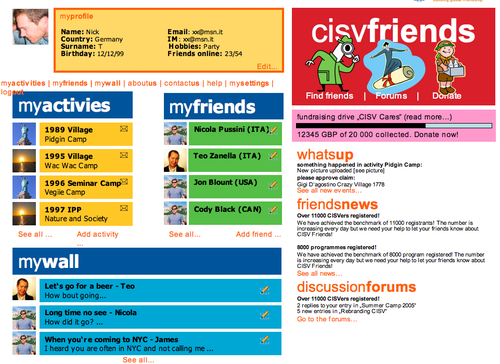October 2010 Archives
Remember all the fuzz that the new CISV logo created, when it was introduced in 2006? I recall receiving something that came close to an e-mail petition form - some people were pretending as if CISV's heart and soul was embedded in the (old) logo.
The American clothing retailer GAP recently released a new, and truly hideous, new logo but quickly pulled back, when customers started complaining - mostly through online social media. The whole story is covered in the Financial Times and they come to the following conclusion:

My point is, that the whole thing wasn't even democratic: Fair and free voting asks everybody to participate, whereas here it's really an angry mob that may or may not represent te majority. Same goes for the CISV logo: The democratically elected board of trustees voted for a change, and a minority asks for withdrawal. Most of all, this minority never ever represented the people that were supposed to be attracted by the new look and feel of CISV: Those who are't even members yet.
Listening to customers is one thing, when they are voting with their wallets. But company logos should not be designed democratically on Twitter. If managers allow themselves to be frightened of the tweeting mob, they will become emasculated, change will be even harder than it ever was, and the status quo will always prevail.

My point is, that the whole thing wasn't even democratic: Fair and free voting asks everybody to participate, whereas here it's really an angry mob that may or may not represent te majority. Same goes for the CISV logo: The democratically elected board of trustees voted for a change, and a minority asks for withdrawal. Most of all, this minority never ever represented the people that were supposed to be attracted by the new look and feel of CISV: Those who are't even members yet.
Today, it seems as if people have calmed down, and the new logo, as much as I can tell, is quite well received and implemented. Good thing, that our leaders had the balls to push this through.
(Thanks, Lars/NOR for the link)
A few years ago in Thailand I spent an evening discussing with Niklas/SWE, who had resently curbed down his involvement in CISV in favor of hands-on local charity work. Essentially, it's difficult to say where best to direct your efforts, if you are willing to invest your free time into doing something. good. To be fair, most people don't chose CISV, because it's the best way to change the world, but for a number of other reasons (like this one) I don't want to discuss here - at any rate, I think it's always important to reconsider if your efforts could better be used elsewhere.
Helene/DEN sends me an interesting excerpt that adds another point to the (never-ending) discussion, of who among the NGOs and IGOs is actually best at changing the world for the better:
Helene/DEN sends me an interesting excerpt that adds another point to the (never-ending) discussion, of who among the NGOs and IGOs is actually best at changing the world for the better:
"The number of people who die before the optimum lifespan is 60000-100000 per day, or about 20 million per year. They die from lack of clean water, clothing, shelter, access to medicines and doctors, etc. - and they are dying unnecessarily in the sense that they all would be alive if the world's goods were more evenly distributed. To this waste of life, we could then add what concerns of our media much more: the much fewer people dying in the 30-40 wars, that are continually taking place around the globe. About 25 million people have died as a result of war since 1945, it is "only" 1,140 people per day, representing 1 / 50 of those who die in the structural, economic emphasized violence. Positively, you can formulate it this way: If you want to do something good and save lives, then it is more important to work against the error evolution than war." (Jan Ørberg: the chapter "Ondskab i det globale samfund", from the book "Ondskabens psykologi", 2004)This notion is very much in line with what we find in Mosquito tactics - that peace is much more than just the absence of war: We're talking about economical injustice that is apparently much more violent than all wars taken together. Transferring this idea to CISV, I'd say, we are an organization that not only opposes war as a way of solving conflicts, but also strives for peace in the sense of a more economically just world. Maybe this should be emphasized in the content of our programmes and the way we communicate our philosophy.
As a long-time advocate of creating video (and animation) to promote (or even better: explain) CISV, I was glad to discover the video above. Even if beautifully designed and proffessional-ooking, I find a few things curious about this motion picture:
- To my knowledge "Children's International Summer Villages" should no longer be used and what the heck happened to the rest of the branding guidelines?
- Why so much focus on "starting with children", when the majority of our programmes deals with youth and adults?
It's actually only the new logo in the end that convinced me, that this wasn't produced in the ninetees... Also, the video underlines my theory, that CISV needs a more clear identity...
Guest post from Sarah/USA.
I wrote once before in FTB the comments section about a crowdsourcing project on Slate.com, where they invited readers to send in ideas for a specific project. Now they're tackling the context of the American classroom, specifically for fifth graders who are, you got it, Village age. We all know a lot about 10 and 11 year olds in a non-formal education setting. How should that translate to a classroom? What about the space affects the learning? How would you have dreamed up your school when you were 11? I know there are other CISVers besides me out there who have ideas and opinions on this. Not only do I hope that CISVers submit ideas, I think this would be a pretty cool activity for a JB or National Board Meeting session. Read the whole article at http://www.slate.com/id/2269307/
I wrote once before in FTB the comments section about a crowdsourcing project on Slate.com, where they invited readers to send in ideas for a specific project. Now they're tackling the context of the American classroom, specifically for fifth graders who are, you got it, Village age. We all know a lot about 10 and 11 year olds in a non-formal education setting. How should that translate to a classroom? What about the space affects the learning? How would you have dreamed up your school when you were 11? I know there are other CISVers besides me out there who have ideas and opinions on this. Not only do I hope that CISVers submit ideas, I think this would be a pretty cool activity for a JB or National Board Meeting session. Read the whole article at http://www.slate.com/id/
I've long been advoacating the use of social media on the internet for the benefits of CISV, especially here at FTB.. However, I've also had my doubts, of how much use it could really be. Malcom Gladwell's must-read piece in The New Yorker compares the aspirations of social media like Facebook and Twitter to the civils rights movements and claims that "lose Networks" are good for some things but not for change. Instead, Malcolm insists, hierachical systems have more power to pursue the drive for change.
 Looking at CISV, it's amazing to see, how many people have signed up for the friends website, the various Facebook groups (and CISV & Me), and participate in the JBpedia project. But how much have we really gained from those networks? Most of JBPedia's most updated content is user's pages, making it rather a social network than a collection of information. Chapters are still struggling to find staff - which requires of the personal-conncetion Gladwell describes. Fundraising hasn't really improved, even though we could contact 1000s of (ex-)CISVers with the click of a mouse. Instead, most of our success stories are driven by our "classical" (or "hierachical") struture from the IEC and IO down to the chapter level.
Looking at CISV, it's amazing to see, how many people have signed up for the friends website, the various Facebook groups (and CISV & Me), and participate in the JBpedia project. But how much have we really gained from those networks? Most of JBPedia's most updated content is user's pages, making it rather a social network than a collection of information. Chapters are still struggling to find staff - which requires of the personal-conncetion Gladwell describes. Fundraising hasn't really improved, even though we could contact 1000s of (ex-)CISVers with the click of a mouse. Instead, most of our success stories are driven by our "classical" (or "hierachical") struture from the IEC and IO down to the chapter level.
Time will tell the truth, and the reality is, I believe, that this rather new form of networking and communication will need some time to settle in: We're still in the process of trying to find out, how best to use Facebook or Twitter or Wikis. Some day in the future, we will in fact be able to truly reap benefits from social media.
Also, on The Economist's website you'll find a more optimistic look on the issue - so, obviously, the issue is far from settled.
 Looking at CISV, it's amazing to see, how many people have signed up for the friends website, the various Facebook groups (and CISV & Me), and participate in the JBpedia project. But how much have we really gained from those networks? Most of JBPedia's most updated content is user's pages, making it rather a social network than a collection of information. Chapters are still struggling to find staff - which requires of the personal-conncetion Gladwell describes. Fundraising hasn't really improved, even though we could contact 1000s of (ex-)CISVers with the click of a mouse. Instead, most of our success stories are driven by our "classical" (or "hierachical") struture from the IEC and IO down to the chapter level.
Looking at CISV, it's amazing to see, how many people have signed up for the friends website, the various Facebook groups (and CISV & Me), and participate in the JBpedia project. But how much have we really gained from those networks? Most of JBPedia's most updated content is user's pages, making it rather a social network than a collection of information. Chapters are still struggling to find staff - which requires of the personal-conncetion Gladwell describes. Fundraising hasn't really improved, even though we could contact 1000s of (ex-)CISVers with the click of a mouse. Instead, most of our success stories are driven by our "classical" (or "hierachical") struture from the IEC and IO down to the chapter level. Time will tell the truth, and the reality is, I believe, that this rather new form of networking and communication will need some time to settle in: We're still in the process of trying to find out, how best to use Facebook or Twitter or Wikis. Some day in the future, we will in fact be able to truly reap benefits from social media.
Also, on The Economist's website you'll find a more optimistic look on the issue - so, obviously, the issue is far from settled.
Does charity degrade and demoralize?
He's a philosopher and and a psycho-analyst, but calls himself an "old-fashioned marxist" . He speaks very fast, with a heavy accent and uses a lo of difficult words. I had to watch his presentation three times to fully grasp it, but once I've unlocked his message, there's nothing I can do bu fully embrace his criticism: Please, please watch Slavoj Zizek's speech on charities (and appreciate RSA's animation):
Remember my post on LemonAID, the guys that got a lot of credit for being "social entrepreneurs" - Zizek obviously shares my doubts on these kinds of companies, he even cites Starbucks, just like I did. "Let's make the evil itself work for the good...global capitalism with a human face". In the comments of that post, a few readers shared their enthusiasm about "Corporate Social Responsibility" (CSR) - Zizek would surely disagree.
Another example: In my hospital we co-operate with an organization that flies kids with congenital heart defects from Afghanistan to Germany to get them to surgery. I never had a good feeling about that project, but Zizek hits the spot when he says: "If you operate a child then they live a little bit better but in the same situation that produced them".
Many CISVers are frustrated by what we do, because the results of our educational work is so hard to measure. Many turn away and look for organisations with a more hands-on approach. Following Zizek however, I do think that we are working much more on the core of the world's problems than developmental charities do.
He's a philosopher and and a psycho-analyst, but calls himself an "old-fashioned marxist" . He speaks very fast, with a heavy accent and uses a lo of difficult words. I had to watch his presentation three times to fully grasp it, but once I've unlocked his message, there's nothing I can do bu fully embrace his criticism: Please, please watch Slavoj Zizek's speech on charities (and appreciate RSA's animation):
Remember my post on LemonAID, the guys that got a lot of credit for being "social entrepreneurs" - Zizek obviously shares my doubts on these kinds of companies, he even cites Starbucks, just like I did. "Let's make the evil itself work for the good...global capitalism with a human face". In the comments of that post, a few readers shared their enthusiasm about "Corporate Social Responsibility" (CSR) - Zizek would surely disagree.
Another example: In my hospital we co-operate with an organization that flies kids with congenital heart defects from Afghanistan to Germany to get them to surgery. I never had a good feeling about that project, but Zizek hits the spot when he says: "If you operate a child then they live a little bit better but in the same situation that produced them".
Many CISVers are frustrated by what we do, because the results of our educational work is so hard to measure. Many turn away and look for organisations with a more hands-on approach. Following Zizek however, I do think that we are working much more on the core of the world's problems than developmental charities do.

